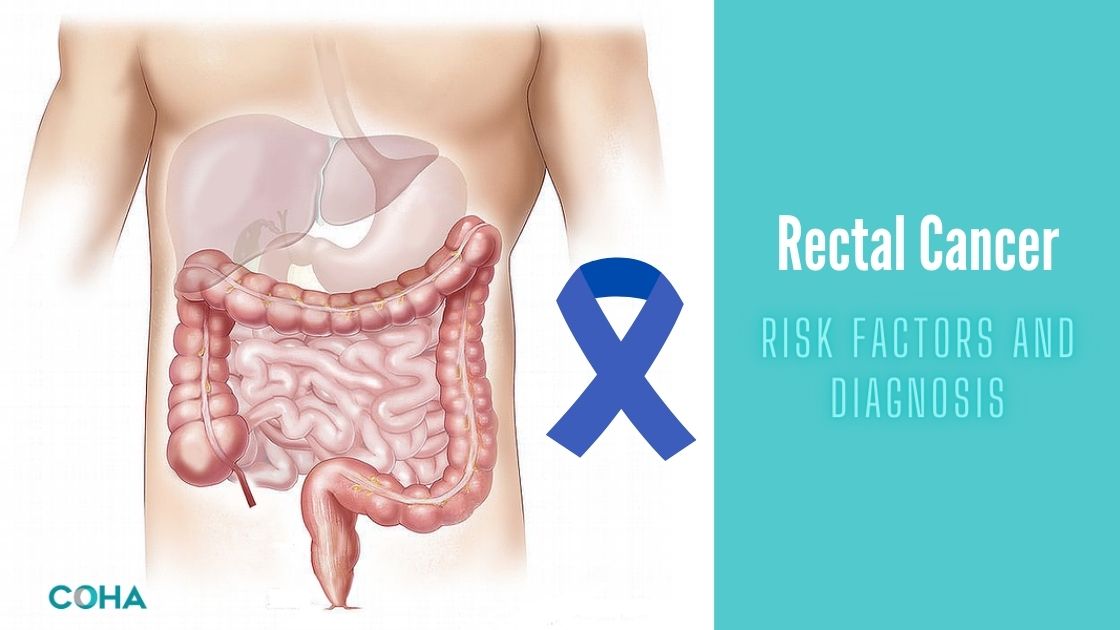


Rectal cancer is the third most common cancer and the second leading cause of cancer deaths in the US. This year, it is estimated that 43,340 new cases of rectal cancer will be reported. The overall 5-year survival rate of people with rectal cancer is 67%. However, if the cancer is diagnosed at an early stage, the survival rate increases to 89%. It is essential to have regular cancer screenings for early diagnosis and treatment.
Rectal cancer occurs when cells in the rectum grow abnormally and uncontrollably. The rectum is the last part of the large intestine, starting at the final segment of the colon and ending at the anus. Over time, the cancer cells can invade and destroy other nearby healthy tissues, spreading to other parts of the body.
These factors may increase your risk of developing rectal cancer:
Older age – The risk of developing rectal cancer increases with age. Most people with this cancer are older than 50.
Family History – Having a family history of rectal cancer can increase your risk of developing the condition.
Being Physically Inactive – You are more likely to develop rectal cancer if you are not physically active.
Personal History – Your risk of rectal cancer is higher if you have already had colon cancer, rectal cancer, or adenomatous polyps.
Unhealthy Diet – Eating a diet containing high amounts of processed meats and red meats can increase your colorectal cancer risk.
Inflammatory Bowel Disease – Chronic inflammatory diseases of the rectum or colon, such as Crohn's disease and ulcerative colitis, increase your risk of colorectal cancer.
Obesity – Obese people are more likely to develop rectal cancer.
Diabetes – People with type 2 diabetes have an increased risk of rectal cancer.
Familial Adenomatous Polyposis (FAP) – This disease causes many polyps in the lining of your rectum and colon. If it is left untreated, FAP can increase the risk of developing colorectal cancer.
Lynch Syndrome – Lynch syndrome, also known as hereditary nonpolyposis colorectal cancer (HNPCC), increases the risk of colorectal cancer. People with Lynch syndrome may develop colon cancer before 50.
Inherited Syndromes – Having genetic syndromes such as FAP, Lynch Peutz-Jeghers syndrome (PJS), and MUTYH-associated polyposis (MAP) can increase your risk for the condition.
Smoking – Smoking has been linked to colorectal cancer.
Alcohol – Regular consumption of alcohol heightens your risk for colorectal cancer.
The following tests can be conducted to diagnose rectal cancer:
Physical Exam and Medical History – Your doctor will check your medical history to know your past illnesses and treatments and perform a physical examination to check for any abnormal lumps or growth.
Colonoscopy – It is performed using a colonoscope, a thin, flexible tube attached to a video camera, to check the inside of the rectum and colon for polyps, abnormal growths, or cancerous cells.
Digital Rectal Exam – Your doctor will examine your rectum to check for any abnormal growths. In women, the vagina may also be examined.
Biopsy – A tissue sample from your rectum is removed and tested in the laboratory to check for cancer signs. The sample may also be checked to see if the patient has a gene mutation that causes HNPCC. Other lab tests that may also be performed include:
Reverse transcription - polymerase chain reaction (RT–PCR) test: This test is used to identify certain changes in a gene or a chromosome, which can help detect cancer.
Immunohistochemistry: This kind of test helps to diagnose cancer and can also identify the type of cancer.
Carcinoembryonic Antigen (CEA) Assay – This test evaluates the amount of CEA in your blood. Both normal and cells cancer cells discharge CEA into the bloodstream. When the CEA level is higher than usual, it can indicate rectal cancer.
After rectal cancer has been diagnosed, the following tests are used to determine the spread of the disease:
Once you are diagnosed with rectal cancer, it is essential to find an experienced oncologist to treat it effectively. At Chesapeake Oncology Hematology Associates (COHA), we have specialists, like Yudhishtra Markan, MD, and Akshar Patel, MD, to treat rectal cancer. Our rectal cancer treatment options include:
Radiation Therapy – It uses high-energy x-ray beams to kill cancer cells and is sometimes combined with chemotherapy treatments.
Chemotherapy – It uses oral or intravenous drugs to kill cancer cells. It is usually recommended if your cancer is in an advanced stage and surgery is not an option.
Surgery – Your surgeon will remove the cancerous tissue inside the rectum.
Immunotherapy – It stimulates your immune system to improve its ability to fight cancer. It is recommended for people with advanced rectal cancers.
Contact or schedule an appointment with us today to receive the best rectal cancer treatment and follow-up care.